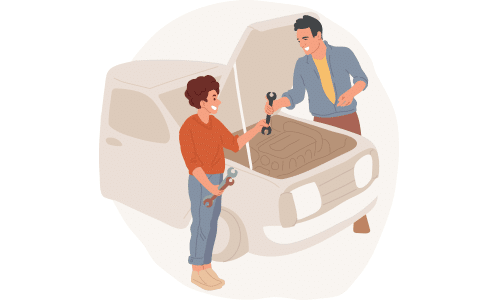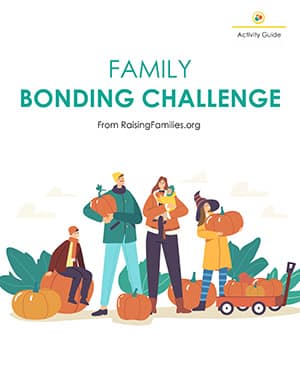- Home
- »
- Family Bonding Challenge
- »
- Turn School Knowledge into...
Turn School Knowledge into Real-Life Wisdom

Age: 5+
Time: varies
Materials: depends on activity
Focus: applying learning to real-world experiences
If you’ve ever sat in a classroom listening to someone drone on about a topic you have no interest in, you’ve likely thought to yourself, “Ugh! What does this have to do with anything? Why do I have to learn this?” It can be pretty hard to turn the facts we learn in school into practical information we can use outside the classroom. As parents, we can help our kids turn school knowledge into real-life wisdom in a few ways.
One of our children’s jobs is to learn about the world around them. When they’re young and at home most of the time, they learn by doing. They observe others and then experiment with their own capabilities until they can match what others are doing.
They make sounds over and over again until they can form words that others understand. They learn that making noises and using words help them communicate and get their needs met. While it’s fun to throw food all over the floor and smear it on their face, kids soon learn that food brought to the mouth with a fork helps their tummies feel less rumbly and upset. That’s the process of turning school of life knowledge into practical wisdom.
When kids get to school, family life often becomes much faster and chaotic. It’s easy to forget that what our children are learning all day still needs to be supported with real-world experience for it to really sink in.
While it might not always be obvious how some curriculum will actually be useful later on, here’s the thing: when you can show your child how their schoolwork connects to life in a fun and interesting way, they’re much less likely to grumble about learning it.
When children discover the practical value of their education, something wonderful happens. They become more curious, more engaged learners who develop critical thinking skills that reach far beyond their homework assignments.
4 Ways to Show Your Turn School Knowledge into Real-Life Wisdom
1. Find Activities That Supplement School Learning.
The first step is pretty simple: find out what your child is currently learning in school. You can casually ask your child over dinner, or if you’re not getting much detail (shocker), reach out to their teacher. If you followed the steps to build a strong school partnership, then this should be pretty easy.
Once you know what topics they’re exploring, you can start brainstorming fun activities that naturally build on those lessons.
Math in Action:
- When your child is learning multiplication or fractions, grab a favorite recipe and have them help you double it. Or, try these other cooking-focused math activities
- Make restaurant outings a little more educational by calculating tips together
- Turn shopping trips into math adventures by figuring out sales tax or comparing unit prices
History Comes Alive:
- If they’re studying a particular time period, try making something from that era together. For example, when my oldest was learning about the Renaissance, we had a blast building a catapult in the backyard
- Create a family timeline that weaves historical events into your own family’s story
- Plan visits to local historical sites or attend reenactments in your area
- Take a trip to a local museum if it has a relevant exhibit
Science Everywhere:
- Set up simple experiments at home that relate to what they’re studying in class
- Start a garden together to explore plant biology, weather patterns, and ecosystems
- Turn your kitchen into a chemistry lab while cooking—discuss reactions, states of matter, and measurements
- Spend time observing wildlife in your backyard or local park to chat about animal behavior and habitats
Social Studies Connections:
- Explore different cultures through cooking international dishes together
- Visit cultural festivals or community events to learn about local diversity
- Map out family trips and discuss the geography, climate, and cultures of places you’ll visit
- Connect current events to historical patterns in age-appropriate conversations
- Explore your own community by visiting the library, city hall, or local government meetings
Art All Around Us:
- Visit art museums and galleries to see different styles and periods up close
- Try recreating famous artworks using different materials and techniques
- Explore public art in your community—murals, sculptures, and installations
- Connect art to other subjects by creating visual timelines for history or illustrating science concepts
- Encourage your child to document family activities through photography, sketching, or collaging
Whatever activities you choose, remember that the magic happens when both you and your child are genuinely engaged. You’ll not only create some wonderful bonding moments, but you’ll also help them discover how their education connects to the world in meaningful ways.
2. Practice Problem-Solving in Daily Life.
The next time your child comes to you with a problem, try this approach: instead of jumping in with a solution, help them work through it step by step. It can be awkward at first but it gets easier with practice.
When they feel frustrated and say it’s too hard or they don’t know what to do, try asking leading questions that help them discover a potential solution on their own. This is the time to be a coach rather than a perpetually sympathetic ear. While emotionally comforting, it doesn’t help them build the skills they’ll need to thrive when you’re not around.
Real-World Problem-Solving Examples:
- Planning a family trip within a budget (math, geography, research skills)
- Figuring out how to fix a broken toy or household item (engineering, physics concepts)
- Organizing their room more efficiently (spatial reasoning, categorization)
- Working through conflicts with friends (communication, empathy, negotiation)
3. Make Learning Part of Everyday Conversations
You don’t need to be formal about this. Simply weaving learning into your daily chats can work wonders. Here are some natural opportunities:
During Car Rides:
- Casually discuss the geography you’re passing through
- Let them help calculate travel time and distance
- Wonder out loud about the science behind how cars work
While Shopping:
- Compare prices together and chat about percentages and discounts
- Read nutrition labels and discuss what makes food healthy
- Take mini-adventures through international food sections to explore different cultures
At Home:
- Bring up current events and gently connect them to historical patterns they might recognize
- Get curious together about how the technology around your house actually works
- Turn cooking time into relaxed chemistry discussions
4. Encourage Real-World Research Projects
When your child shows genuine interest in something—anything!—that’s your golden opportunity. Encourage them to dig deeper using the research skills they’re developing in school, but keep it fun and pressure-free.
- Help them research their favorite animal and maybe put together a fun presentation for the family
- Dive into family genealogy together to practice research skills while discovering your family’s story
- Explore different career paths that spark their curiosity
The Long-Term Benefits We See When We Turn School Knowledge into Real-Life Wisdom
When you consistently help your child turn school knowledge into real-life wisdom, you’re nurturing something much bigger than academic success. You’re skilfully cultivating:
- Critical thinking skills that will serve them well throughout their entire life
- Confidence in their ability to tackle new challenges with curiosity rather than fear
- A genuine love of learning that goes far beyond homework and tests
- Problem-solving abilities they’ll use in future careers, relationships, and everyday situations
Remember, the goal isn’t to turn every single moment into a teaching opportunity (that would be exhausting for everyone!). Instead, it’s about helping your child naturally see that learning is everywhere around them, and that their education is a wonderful tool for navigating life with confidence and joy.
Carolyn Savage
Carolyn is a writer, proofreader, and editor. She has a background in wildlife management but pivoted to writing and editing when she became a mother.
In her "free time" she is a 4th Dan (degree) Kukkiwon certified black belt in Taekwondo, loves learning to craft from her enormously talented children, and then teaching what she's learned to her enormously talented grandmother. Read full bio >>


